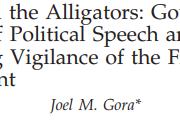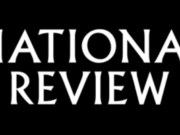Today at 11:30 a.m. (registration 11:15) Senate Minority Leader Mitch McConnell will deliver what promises to be a major address at the American Enterprise Institute. (Live stream here.)
Speaking under the title, “Growing threats to our First Amendment rights,” the Senator is expected to call attention to the efforts by the Administration to undermine free speech rights.
Perhaps the biggest problem with giving the government power to regulate political speech – “campaign finance reform” – is that that power has been routinely used to try to silence political opposition.
Over the past seven years, a series of court decisions have struck down, on First Amendment grounds, many campaign finance regulations. The best known of these are the Supreme Court decision in Citizens United v. Federal Election Commission and the U.S. Court of Appeals decision in SpeechNow.org v. Federal Election Commission (CCP filed an amicus brief on the side of the plaintiffs in Citizens United, and together with the Institute for Justice, CCP represented the plaintiffs in SpeechNow). These decisions have increased freedom of speech across the political spectrum – for example, Citizens United allows both corporations and unions to spend money to support or defeat candidates – something unions took great advantage of in the recent Wisconsin recall election. SpeechNow.org allows anybody to form an independent expenditure committee (what the press has dubbed “Super PACs”) to raise money to advocate for the election or defeat of a candidate. Emily’s List v. Federal Election Commission, another important Court of Appeals case striking down federal regulations, was filed by – as the title implies – Emily’s List, the influential liberal, pro-Democratic PAC. Nevertheless, many Democrats have openly worried that these decisions will hurt their party at the polls.
Sadly, the response of many Democrats and liberal organizations – outside of the ACLU, which has courageously stuck to its principles – has been to try to discredit these judicial decisions and, worse, to silence conservative and pro-Republican speakers who seek to take advantage of there constitutional rights of speech and association.
Hence, in his 2010 State of the Union address, President Obama falsely and somewhat xenophobically claimed that Citizens United would “open the floodgates for … foreign corporations, to spend without limits in our elections.” (The decision specifically did not change the law regarding foreign contributions and expenditures, and the Supreme Court summarily reaffirmed those laws the next year). Meanwhile, an unprecedented effort began to silence conservative speakers.
Part of the attack has been informal. The Obama administration and the Obama campaign have both publicly vilified Republican and conservative financial supporters, suggesting that they were guilty of criminal activity, tax evasion, and unpatriotic behavior. Meanwhile, “progressive” groups have harassed gatherings of private citizens, and organized boycotts not only of conservative businesses and speakers, but of others who merely do non-political business with those speakers.
The response has also been legal. For example, in 2010 and again this year Senate Democrats have sought to pass the so-called “DISCLOSE Act,” requiring Americans to make, new, unprecedented reports to the Federal government regarding their political activity. In introducing the bill, lead sponsor Chuck Schumer (D. N.Y.) noted that “the deterrent effect [of such reporting] should not be underestimated.” No, it should not, given that financial supporters of Proposition 8 in California found their employers boycotted until they resigned or were fired, and their property vandalized. The DISCLOSE Act also contained numerous provisions aimed directly at preventing the business community from speaking, while exempting unions.
Unable to pass the DISCLOSE Act through Congress, Democrats have attempted to enact it through regulation by the Federal Election Commission. However, that body is a non-partisan, independent agency, with 3 Democratic and 3 Republican commissioners, and it has so far refused to go along. Thus efforts have been underway to regulate what is perceived to be pro-conservative or pro-business speech at agencies where Democrats are in control, including the Federal Communications Commission, the Securities and Exchange Commission, and elsewhere. The President has also threatened to issue an executive order requiring businesses seeking government contracts to first inform the administration of their political activities, and that of their executives.
How determined is the administration? Earlier this week top advisor David Axelrod stated, “we will use whatever tools [are] out there, including a constitutional amendment,” to stop conservative spenders – specifically naming two private citizens as examples of the type of people that he thought should be silenced. Never before has the Constitution been amended to restrict the rights of U.S. citizens to participate in politics.
Over his career, Senator McConnell has established himself as the Senate’s strongest and most principled defender of the First Amendment, opposing both Democratic and Republican efforts at “campaign finance reform” and other restrictions on speech, such as efforts to amend the Constitution to prohibit flag burning. In tomorrow’s speech, he is expected to call on Americans of all political stripes to stand up for free speech and to oppose efforts to amend the First Amendment in order to give government the power to regulate political speech.
One can register – or watch the event on streaming video, here.














